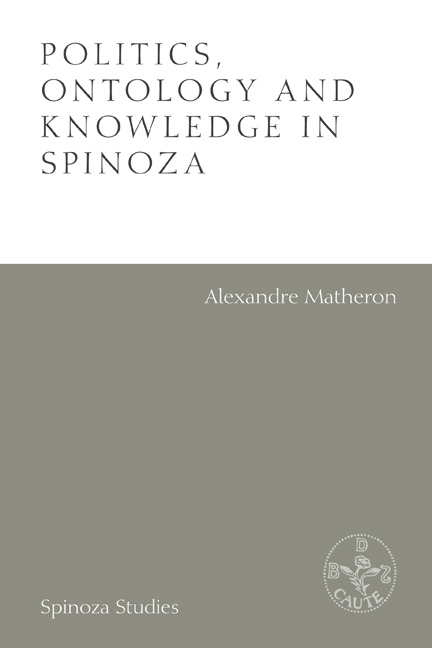Book contents
- Frontmatter
- Contents
- Abbreviations
- Notes on Translation and Acknowledgements
- A Revolutionary Beatitude: Alexandre Matheron’s Spinozism
- I Spinoza on Ontology and Knowledge
- 1 Idea, Idea of the Idea and Certainty in the Tractatus de Intellectus Emendatione and the Ethics
- 2 Essence, Existence and Power in Part I of the Ethics: The Foundations of Proposition 16
- 3 Physics and Ontology in Spinoza: The Enigmatic Response to Tschirnhaus
- 4 The Year 1663 and the Spinozist Identity of Being and Power: Hypothesis on a Development
- 5 Eternal Life and the Body According to Spinoza
- 6 Intellectual Love of God, Eternal Part of the amor erga Deum
- II Spinoza on Politics and Ethics
- 7 State and Morality According to Spinoza
- 8 Ethics and Politics in Spinoza (Remarks on the Role of Ethics IV, 37 Scholium 2)
- 9 Indignation and the Conatus of the Spinozist State
- 10 Passions and Institutions According to Spinoza
- 11 The Problem of Spinoza's Evolution: From the Theologico-Political Treatise to the Political Treatise
- 12 Is the State, According to Spinoza, an Individual in Spinoza’s Sense?
- 13 The Ontological Status of Scripture and the Spinozist Doctrine of Individuality
- 14 Spinoza and Power
- 15 Spinoza and Property
- 16 Spinoza and Sexuality
- 17 Women and Servants in Spinozist Democracy
- 18 The ‘Right of the Stronger’: Hobbes contra Spinoza
- 19 The Theoretical Function of Democracy in Spinoza and Hobbes
- 20 Spinoza and the Breakdown of Thomist Politics: Machiavellianism and Utopia
- Appendix 1 Interview with Laurent Bove and Pierre-François Moreau
- Appendix 2 Chronology of Works by Matheron
- Works Cited
- Index
11 - The Problem of Spinoza's Evolution: From the Theologico-Political Treatise to the Political Treatise
Published online by Cambridge University Press: 03 October 2020
- Frontmatter
- Contents
- Abbreviations
- Notes on Translation and Acknowledgements
- A Revolutionary Beatitude: Alexandre Matheron’s Spinozism
- I Spinoza on Ontology and Knowledge
- 1 Idea, Idea of the Idea and Certainty in the Tractatus de Intellectus Emendatione and the Ethics
- 2 Essence, Existence and Power in Part I of the Ethics: The Foundations of Proposition 16
- 3 Physics and Ontology in Spinoza: The Enigmatic Response to Tschirnhaus
- 4 The Year 1663 and the Spinozist Identity of Being and Power: Hypothesis on a Development
- 5 Eternal Life and the Body According to Spinoza
- 6 Intellectual Love of God, Eternal Part of the amor erga Deum
- II Spinoza on Politics and Ethics
- 7 State and Morality According to Spinoza
- 8 Ethics and Politics in Spinoza (Remarks on the Role of Ethics IV, 37 Scholium 2)
- 9 Indignation and the Conatus of the Spinozist State
- 10 Passions and Institutions According to Spinoza
- 11 The Problem of Spinoza's Evolution: From the Theologico-Political Treatise to the Political Treatise
- 12 Is the State, According to Spinoza, an Individual in Spinoza’s Sense?
- 13 The Ontological Status of Scripture and the Spinozist Doctrine of Individuality
- 14 Spinoza and Power
- 15 Spinoza and Property
- 16 Spinoza and Sexuality
- 17 Women and Servants in Spinozist Democracy
- 18 The ‘Right of the Stronger’: Hobbes contra Spinoza
- 19 The Theoretical Function of Democracy in Spinoza and Hobbes
- 20 Spinoza and the Breakdown of Thomist Politics: Machiavellianism and Utopia
- Appendix 1 Interview with Laurent Bove and Pierre-François Moreau
- Appendix 2 Chronology of Works by Matheron
- Works Cited
- Index
Summary
Here I would simply like to elaborate on the interpretation that I gave, long ago, in Individu et communauté chez Spinoza, concerning a fact that, in one sense, nobody denies: Spinoza, in the Theologico-Political Treatise, accounts for the genesis of the State in contractarian terms, whereas, in the Political Treatise, he stops making recourse to the language of the social contract. Is this a real shift or only an apparent one? To my mind, it is real: back then I maintained, and I still think, that the language of the TTP must be taken seriously, and that its disappearance in the TP really corresponds to the emergence of a new doctrine; I characterised, and would still characterise, this new doctrine as consisting in a non-contractarian explanation of the genesis of the State solely out of the anarchic and blind play of relations of forces such as they spontaneously function in the state of nature according to the mechanism of the imitation of the affects. But some objections have been raised, and I would like to respond to them.
First, we must eliminate the false problems. Spinoza always held that the existence and the legitimacy of political society stems, ultimately, from the consent of its subjects; if one wants to call that a ‘contract’, then he is clearly a contractarian; but in that case it is a question of knowing how this consent is given. Similarly, Spinoza always held that right is identical to power [puissance]; if one wants to call ‘contractarianism’ the doctrine according to which entering into a contract itself establishes, independently of any subsequent variation of force relations, an irreversible obligation, then he is no contractarian at all; but in that case it is a question of knowing how the unified collective power that defines the right of the sovereign is constituted. What might be called the at least apparent contractarianism of the TTP thus concerns, not the foundation of the legitimacy of the State, but its mode of production: in that text, the State does seem to be born of a collective, deliberate and concerted decision that, as in Hobbes, constitutes a break with the dynamics of the state of nature in order to create a new relation of forces from scratch.
- Type
- Chapter
- Information
- Politics, Ontology and Knowledge in Spinoza , pp. 163 - 178Publisher: Edinburgh University PressPrint publication year: 2020



